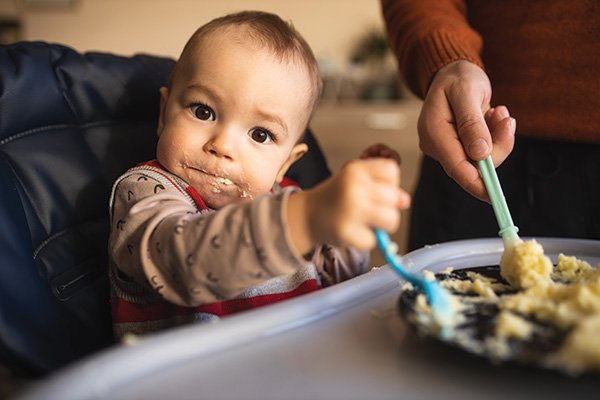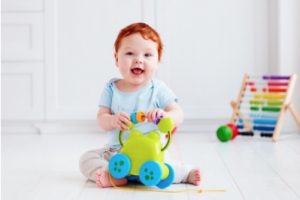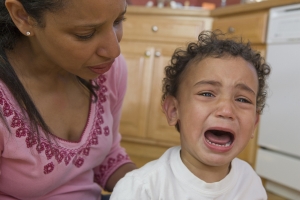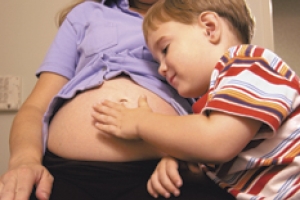
There’s a lot to love about toddlers: snuggles, endearing moments, chubby cheeks, adorable sayings and hilariously mispronounced words. But toddlers also bring a unique set of challenges “to the table” and mealtimes are no exception. One of the most common: Often toddlers have no interest in dinner, but are more than willing to eat snacks. Here’s what to say and do in the moment and how to survive this season of life.
WHY TODDLERS REFUSE DINNER
Dinnertime seems to be what parents struggle with most when it comes to feeding toddlers. There are legitimate reasons dinner is rarely a toddler’s time to shine:
- They’re tired. Days are long for toddlers, particularly if they no longer nap.
- They’ve kept it together all day, especially if they attend preschool or daycare. Toddlers are ready to let it all hang out in the place (and with the people) they feel safest around.
- They’ve snacked too much (or too close to dinner), so they’re not hungry.
- They’ve had too much milk, water or juice. Filling up on liquids leaves little room for food.
- They’re unsure. Dinner often includes unfamiliar foods and things mixed together.
WHY TODDLERS PREFER SNACKING
Snacks are fun! They’re uncomplicated, easy-to-eat, familiar foods. Snacks often include items like yogurt, fruit, crackers, cheese sticks, maybe even sweets like graham crackers or mini-cookies. They know they like snacks, there are no risks involved and they can eat them on the go. What’s not to love?
WHAT TO DO (in the Moment and Tomorrow)
When your toddler refuses dinner, but insists on crackers, there are steps you can take in the moment and things you can implement tomorrow.
What to do in the moment:
Stay calm. Toddlers know how to push buttons, and saying “no” is an easy way to do that. As hard as it is, remain calm.
A few helpful phrases:
- “You don’t have to eat it.” If your toddler is used to drama when she says “no” at the table, she may be surprised by your new, cool-as-a-cucumber reaction. This powerful phrase instantly defuses tension.
- “There’s XYZ on the table if you want.” Make sure there’s always something on the table your child likes—such as veggies, rice, tortillas or fruit. If she refuses dinner, point out the item on the table in a matter-of-fact, zero-pressure way.
- “Looks like you’re not hungry right now; that’s OK.” If your child refuses to eat, say this calmly and let her be excused from the table (or ask that she stay for a few more minutes with the family).
Wrap up their dinner. We started doing this when my younger son went on a dinner strike as a toddler. We saved his (untouched) dinner plate and offered it to him later when he asked for a snack. At first, our son didn’t want his leftover dinner (he was holding out for something better). But soon enough, he was scarfing down his spaghetti or soup, just an hour or so after the rest of the family. Important note: A saved plate is not punishment. It’s encouragement to eat dinner when they’re hungry.
Offer a boring bedtime snack. If the leftover dinner is refused, here’s a strategy I got from Dina Rose, author of It’s Not About the Broccoli. She advocates for having a boring but nutritious backup food that your child likes, but doesn’t love. Rose’s suggestions: cottage cheese, a glass of milk, plain yogurt (not flavored), beans or tofu.
What to do starting tomorrow:
Put a cushion between snack time and dinnertime. As a dietitian, I think snacks can add a lot of value to a child’s (or grown-up’s) day. But it’s easy for snacking to get out of hand with toddlers, who love to nibble on the go. Snacks too close to mealtime can sabotage dinner, so avoid snacks in the hour before meals.
Establish a rough snack schedule. Try mid-morning and mid-afternoon. Asking your toddler to wait may be tricky at first if she’s used to snacking whenever she wants, but sticking to dependable meal and snack times reassures kids that there are lots of chances to eat.
Consider eating dinner earlier. If your toddler’s hunger doesn’t sync up with your family’s regular dinnertime, consider eating earlier or serving your child a portion of the meal while you finish preparing it. Remember, this is a season of life that will pass. You won’t always be cooking dinner at 4pm.
Center snacks around “meal foods.” Snack has come to mean packaged, processed foods like pretzels, gummy fruit snacks and granola bars. Those things are perfectly fine to have sometimes, but kids shouldn’t think “treat” when they think “snack.” Most of their snacks should be built around the kinds of foods you serve at mealtime. I call those meal foods—fruits, vegetables, whole grains, meats, beans, nuts, and dairy (or non-dairy) foods and drinks. This practice helps toddlers eat foods filled with nutrients they need for growth (iron, zinc, calcium, etc.).
Some meal food snacks include hard-boiled egg and crackers, half a sandwich, hummus with cucumbers or pita or a small bowl of dinner leftovers.
WHAT NOT TO DO
- Don’t get angry. Prioritizing a pleasant (ish) dinner table is most important. As much as possible, avoid negative emotions at the table.
- Don’t insist they eat. Forcing a child to eat can disrupt a child’s internal ability to regulate hunger and fullness. It may also cause children to dig in their heels even more. In one research study, preschoolers ate more and made fewer negative comments about food when they weren’t pressured to eat, compared to kids who were pressured.
- Don’t punish kids for not eating. Eating (or not eating) should never be connected with punishment. Kids shouldn’t feel “bad” or “good” because of what they ate (or didn’t eat). Don’t withhold favorite toys or privileges because they didn’t eat dinner.
TROUBLE-SHOOTING GUIDE TO MEALTIMES
My toddler won’t sit at the table.
Sitting still at the table may feel boring to a busy toddler. So, adjust expectations (no long, leisurely meals); start with 5–10 minutes. Remind them frequently that sitting at the table is what your family does at mealtime. Be sure their seat is comfortable and appropriate. Would your child benefit from a booster or foot support?
My toddler wants to eat the same thing every day.
“Food jags” (when kids eat the same foods meal after meal) are very common at this age, but it’s important for children to eat a variety of foods. Remind your child that you eat different foods on different days and you’ll have her favorite again soon.
My toddler won’t eat foods she used to love.
This is an especially frustrating part of picky eating: refusing foods previously eaten. Toddlers have independent streaks and enjoy the power of saying no. Keep calm and stay the course. Continue to offer the foods with this reassurance, “You don’t have to eat it.”
My toddler is throwing food.
Babies throw food to explore and figure out cause and effect, but toddlers often do it to get attention. Be clear and calm. Say, “We don’t throw food,” and remove the food he’s thrown (instead of putting it back on the plate or tray and creating a game). If he continues, say, “Looks like you’re done eating,” and remove him from the chair. Next time, put smaller amounts of food on the plate. Feel free to offer more if he finishes that portion.
Sally Kuzemchak is a registered dietitian, nutrition writer, mom and book author. Follow her at www.RealMomNutrition.com.









